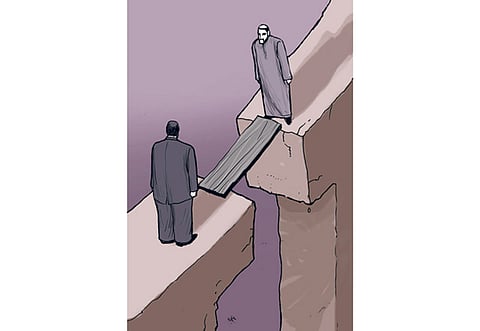Lost nation without a national project
As long as Arabs are divided, they will not win their battles or give their people hope for a better future

In the second half of the 20th century, the world shifted from the western conflict involving France, Britain, Italy and Germany, to the ideological international struggle between the communist East and the capitalist West, which had a direct and indirect impact on the Arab nations.
The effect of the East-West ideological struggle on the Arab nations led to the creation of inter-Arab struggles.
However, the characteristics of the 21st century are no longer based on ideological grounds, but on competition between superpowers.
This started at the beginning of the 21st century, when great powers entered into competition in economy, trade and other areas.
Moreover, social theories and discussions on socialism and social justice have declined, to be replaced by political agendas on ways of ruling in view of the dominant concepts of free economy.
National slogans and themes of national independence have declined, to be replaced by slogans of globalisation and the global village.
Consequently, the political perspective on nationalism has weakened, while the talk about common cultures between people and countries has increased.
All this is happening now in the 21st century, but in an atmosphere of cultural tension between the Islamic East and the Secular/Christian West in the wake of the September 11 attacks and their repercussions in various parts of the world.
Today, there are people who are living in fear that a terrorist act may happen in their countries, while there are others who are witnessing daily terror attacks in their nations as a result of a foreign occupation or domestic oppression.
The world has divided into two kinds of societies; those who fear ghosts and those who live like ghosts. However, they all share the fear of an uncertain future.
In fact, successive US administrations, especially those supported by arms factories and companies, were always in need of an "outside enemy" to justify the policy of military deployment, maintain American superiority and guarantee the subjection of European countries.
Tipping point
Many writers have written about this, especially after the collapse of the Soviet Union. Yet, all these writings were just ink on paper until the terrorist attacks took place on September 11, 2001.
September 11 was the day of victory for extremism in the entire world — a day on which political and ideological fundamentalism raised its voice in every corner of the globe.
Following this ill-fated day, international extremists have united, even though they fight in different arenas.
Of course, worldwide reactions to the September 11 attacks were stupid. The so-called "war on terrorism" failed because it was based on a flawed theory embraced by the George W. Bush administration, which repeated the same mistakes committed by former US administrations against their communist enemy during the Cold War.
At that time, America's communist enemy was seizing control of countries from the Far East of Asia to the heart of Europe, while maintaining its influence and presence in most parts of the world through communist parties there. Indeed, Moscow was in possession of atomic bombs and nuclear missiles targeting the US and its western allies.
Comparing that time with today's world, the picture looks totally different.
This leads to a question about America's new enemy. What is the status of the new enemy? It is the war of ghosts but based on violent practices by extremist groups that have experienced terrorism in their countries first, similar to what happened in many Arab and Islamic countries.
Currently, Arabs are experiencing several domestic problems and facing many challenges on both regional and international levels.
Among the most prominent problems and challenges that faced Arabs in various stages in the last century is international and regional thirst for the Arab fortune and natural resources and their significant strategic locations.
Zionism and its association with foreign powers, which resulted in the occupation of Palestine and other Arab territories, is another challenge.
Arab division and inter-Arab political and border conflicts, which resulted from the policy of divide and rule imposed by colonial powers last century, and the impact of the Cold war between the Communist East and the Capitalist West on the Arab world are also among the challenges facing Arabs.
Arab political and ideological parties have tried to handle these challenges and problems jointly and separately, but failed to do so.
However, this failure has not changed the fact that there is a need to build an ideological and political Arab project based on pan-Arabism.
Pan-Arabism should not contradict the plurality of home countries but work towards integrating them into one bloc, similar to the European model at a minimum level, or even a federation such as the United States of America at a maximum level.
The Arab project must be based on democracy, the Islamic Arab civilisation, and Arabism that rejects the use of violence to achieve its aims.
Despite the glimpses of hope that appear from time to time, the status of Arabs has not changed. It is regretful that the Arab nation, which enjoys many elements of unity and solidarity during conflicts and crises, is becoming even more divided.
It is impossible for a divided nation that does not have a single progressive project to win its battles or give its people hope for a better future.
Sobhi Ghandour is director of Al Hewar Centre in Washington.

